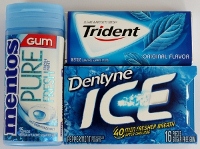Chewing Gum Beneficial in Reducing Bacteria
 According to a recent study published in the journal PLOS One, chewing sugarless gum on a daily basis may contribute to a long-term reduction of bacteria in the mouth. Researchers from the University of Groningen and Wrigley found that chewing gum for 10 minutes can reduce the bacterial load in saliva by about 10%. The research team also found that gum chewing removed a comparable amount of bacteria to flossing, although gum chewing does not remove bacteria from the same parts of the teeth as flossing.
According to a recent study published in the journal PLOS One, chewing sugarless gum on a daily basis may contribute to a long-term reduction of bacteria in the mouth. Researchers from the University of Groningen and Wrigley found that chewing gum for 10 minutes can reduce the bacterial load in saliva by about 10%. The research team also found that gum chewing removed a comparable amount of bacteria to flossing, although gum chewing does not remove bacteria from the same parts of the teeth as flossing.
Previous studies by groups such as the American Dental Association have proved that chewing sugarless gum after meals can help prevent tooth decay because gum chewing increases the production of saliva, which washes away debris, neutralizes acids produced by bacteria, and re-mineralizes tooth enamel. The Groningen study’s finding is significant because it establishes that the gum itself traps and removes bacteria. This discovery may encourage the development of sugarless gum to remove specific disease-causing bacteria from the mouth.
Sources:
PLOS One, “Quantification and Qualification of Bacteria Trapped in Chewed Gum”. Authors: S.W. Wesel, H.C. van der Mei, D. Morando, A.M. Slomp, B. van de Belt-Gritter, A. Maitra, H. Busscher.
American Dental Association
Share:






Comments